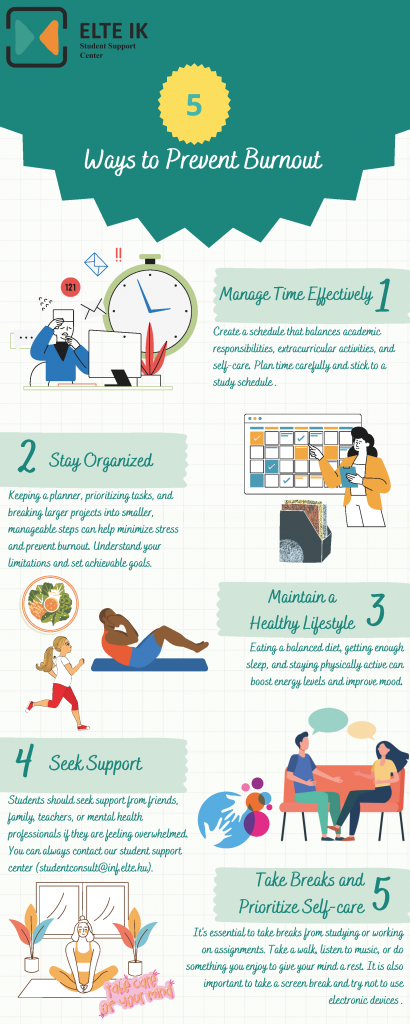
Student burnout is a common phenomenon among university students and can be defined as a state of physical, emotional, and mental exhaustion caused by excessive and prolonged stress. Studies have found that burnout is particularly common among students in demanding fields such as informatics, which requires intense concentration, long hours of coding and problem-solving, and a high level of detail-oriented work. This can lead to a loss of motivation, increased negative thoughts and feelings, decreased academic performance, and a lack of satisfaction with life in general. In recent years, the number of students experiencing burnout has risen dramatically and it is becoming increasingly important to address this issue.
Written by: Ymeri Nitë (psychology fieldwork student at the Student Support Centre)
The root cause of student burnout can be attributed to several factors, including a heavy workload, unrealistic expectations, financial stress, and a lack of time management skills. In addition, social and cultural pressures, such as pressure to perform well academically, can also contribute to burnout.
Preventing student burnout requires a multi-faceted approach that addresses the root causes of stress and promotes student well-being. In order to do this it is essential to establish healthy habits and maintain a good work-life balance. Some strategies that can help include:
- Manage time effectively: Time management is critical in preventing burnout. Create a schedule that balances academic responsibilities, extracurricular activities, and self-care. Prioritize rest, sleep, and exercise to reduce stress and promote physical and mental health. It is important to plan time carefully and stick to a study schedule, in order to avoid cramming, which is a significant source of stress and can lead to burnout.
- Stay organized: Staying organized can reduce stress and help students prioritize tasks. Keeping a planner, prioritizing tasks, and breaking larger projects into smaller, manageable steps can help minimize stress and prevent burnout. Students must set realistic expectations for their academic and personal lives and avoid over-committing themselves. It is important to understand your limitations and set achievable goals, rather than trying to do too much at once.
- Maintain a healthy lifestyle: Eating a balanced diet, getting enough sleep, and staying physically active can boost energy levels and improve mood. Regular exercise has been shown to help reduce stress, anxiety, and depression, and promote overall well-being. According to a study by the American College Health Association (ACHA), students who engage in regular physical activity and have a positive outlook on life have fewer symptoms of burnout.
- Seek support: Students should seek support from friends, family, teachers, or mental health professionals if they are feeling overwhelmed. Talking to someone about stress and worries can provide a sense of relief and help reduce feelings of isolation. It is important for students to know that they are not alone and that there are resources available to them, such as counseling and mental health services that our Student Support Center offers. (You can contact us via the studentconsult@inf.elte.hu email address or by filling out an application sheet on our website: https://dtk.elte.hu/contact/)
- Take breaks and prioritize self-care: Regular breaks can help students recharge and prevent burnout. It’s essential to take breaks from studying or working on assignments. Take a walk, listen to music, or do something you enjoy to give your mind a rest. Engage in activities that promote relaxation. Taking short breaks throughout the day, such as a quick walk, can help refresh the mind and increase productivity. Also, it is really important to take some time off the screen and not using electronic devices.
However, for some students, burnout may still occur despite their best efforts. It is crucial to take immediate action to prevent further damage. Here are some tips for coping with student burnout:
- Identifying the cause: Understanding the underlying reasons for burnout can help students address the root of the problem and find effective solutions.
- Reevaluating priorities: Students should assess their priorities and eliminate non-essential activities to reduce stress and workload.
- Seeking professional help: Seeking help from a mental health professional can provide support and guidance in managing stress and burnout.
- Reframe negative thoughts: Try to reframe negative thoughts into positive ones and focus on your strengths and accomplishments.
- Practicing mindfulness: Engaging in mindfulness activities, such as meditation, or even just going for a walk can help reduce stress and improve mental well-being. Make time for hobbies, interests, and activities that bring you joy and relaxation.
In conclusion, student burnout is a growing issue in universities and can have severe consequences for both mental and physical health. However, by taking proactive steps to address this students can overcome burnout and maintain a healthy and productive academic environment.

References:
American College Health Association (ACHA). (2019). National College Health Assessment II: Undergraduate Reference Group Executive Summary. Hanover, MD: ACHA.
American Psychological Association (APA). (n.d.). Stress in College. Retrieved from https://www.apa.org/topics/college-stress
Lever, N., & Kaman, T. (2018). University students’ stress and burnout: A literature review. Journal of Educational and Social Research, 8(2), 15-26.
Maslach, C., & Leiter, M. P. (2016). Burnout: 35 years of research and practice. Career Development International, 21(2), 160-163.
Mayo Clinic. (2021). Student stress: Tips for coping. Retrieved from https://www.mayoclinic.org/healthy-lifestyle/stress-management/in-depth/student-stress/art-20195404
